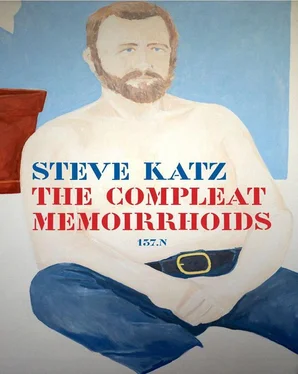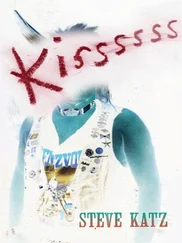Yvette does her Florence Nightingale after Rafael and Jacinta leave, and spends a lot of good time with me watching movies and ball games, which is all I have energy to do. She ferries me to the hospital when my two weeks of catheterization are up, and waits for me until the doctor frees up, from about 11 a.m. till 5 p.m. The two weeks of catheterization were gross, from uncomfortable to painful. It felt like some kind of penance for any number of vague transgressions.
Dr. Wilson is in high gear when she finally has time to see me. This feels like graduation day, or the denouement of some painful comic opera. The doctor usually wears her official white hospital coat when I meet with her. This time as I am stretched out on a gurney in the embarrassing flowered thin flannel hospital shmatta, she appears in a skin tight red knit dress with heels. It isn’t fair. It’s like a moment of comic recognition. Maybe she is fixing to run off on a dinner date after she does me. She pours the systogram dye through the catheter, and checks the monitor to see if my bladder is leaking. I guess it’s okay. She leans over, smiling, and whispers, “You’ve got a beautiful bladder.” It’s like a line out of Aristophanes. I should jump up and dance with her in her red dress, but “jump up” is not now within my range of motion. “You probably say that to all the boys,” I say. I’ve never fielded this compliment before. She laughs, and yanks the catheter, a brief moment of sharp pain for which she apologizes. She assumes a slight squat with her legs spread, and demonstrates how to exercise the Kegel sphincter, as if I can see it through the red dress and flesh. Then she hands me a pad to wear in my underpants. “You’ll like the ones you get at Walgreens better than these hospital pads,” she says, and my surgeon disappears through the door in a blur of red. My surgeon is gone.
Yvette waits for me in the lobby, and seems pleased that I’ve survived. She drives me home in her rattling Passat, and drops me at the door of my building.
I settled comfortably into the back row of the science class. There I set myself to writing my tennis novel, in one of those lined composition books that continue to be common in the school supplies, with a mottled black and white cover of hard cardboard, stitched pages, binding glued with black cloth. This was at Humboldt JHS, P.S. 115 in Washington Heights. The story in my family was that my father had once been a tennis star, had once won a citywide doubles championship. When I was old enough he was too sick to coach me in my game; nonetheless, I had my tennis fantasies.
The science teacher was the sultry Miss Makarof. Science was her game; sexy was her fame. She always left the top two buttons of her blouse or sweater undone, exposing her cleavage to the stares of horny, curious thirteen year old eyes. She liked to sit on the boys’ desks, particularly on Zogi’s. George Zografi was already shaving, and looked almost nineteen. She plumped down there, and the fold of her buttoned skirt fell away from her knee; then she asked us about the heart of the frog we had just dissected. I stared deep into the scribbles I had made in my notebook. Sometimes I flipped through the pages, and was astonished at how many words I had already put down, and how little anything moved.
One day Miss Makarof made it to the back of the room, and settled on my desk, her cheeks spreading across my tennis novel. She asked what I was doing. I love science, I assured her. She leaned to one side and slipped the notebook out from under her flesh. What is this, she asked. When I told her of my novel she continued unctuously to ask what that had to do with science. I had no answer. Her lean over me, cleavage pouting, was too intimidating even to be sexy. I stared into the shadows of that valley. What was hidden there? It wasn’t science. It wasn’t tennis. She smelled rank and attractive, close to the power of skunk I had smelled once driving into Westchester with my family. She was the anti-muse. She was the succubus of writer’s block. I couldn’t write another word of the tennis novel. Words never came.
One afternoon as I was scratching around my Google-yard I noticed that in an article about my work someone referred to me as a septuagenarian writer. First I thought, “What a revolting development this is!” Then I wondered if there were any advantages, like the creepy if relaxing idea that I might never get laid again. Senior discounts, yes! I never expected to reach the “…genarian” stage ever. Does it mean, finally, maturity!? I hope so. Will I get as far as octo…? nono…? I’ve felt like a beginner with every book I’ve written, and I think, “If only I were mature enough, if only I knew enough, I could write this book well.” In each sentence I feel pressed to reinvent the language, re-imagine the world. There’s no let-up, no rest, not even for a septuagenarian writer.
So as I was talking with Michel Williatte-Battet, just before I sold my place in Cape Breton, we discussed the opportunities, particularly sexual opportunities, that we had passed up or missed in our lives. Michel runs a gift shop at St. Joseph du Moine, the best shop on Cape Breton Island. He’s a terrific, original painter and carver, a subtle visual ironist, whose story of how he backed into both Cape Breton and the folk art business is worth exploring. He’s at least 20 years younger than myself, so no septuagenarian. During the period of our lives when we were offered and decided to reject erotic opportunities, we agreed that we assumed that life would always be full of sensual possibilities. Gratification was endless and easy, we thought; but at a certain point life locks you in and you come to understand that these encounters are limited and that experience is finite, and each hot bump is precious. And how strange, we noted, that recollections of missed opportunity are often more erotic than memory of connecting. The scent of the sensual is almost always sweeter as potential in the mind.
I’ve never been sympathetic with the puritanical imperatives of American moral politics. Let it be. Tiger Woods, relax. Gov. Sanford, don’t cry for Argentina. Even the faithful chickadee jumps nests, and even the mate-for-life swan. They all check around to see what’s available, maybe looking for stronger DNA, or just because of what variety is. When I was a devoted husband I often went with the digression. It seems natural, healthy, keeps the social, sexual gears oiled. I’m sure many, if not most, people do this, despite potential moral stigma, despite attendant pressure to guilt. Even the twitchy little wren checks out the new feathers in another nest. What disturbs me is the pleasure we seem to take in exacting punishment, and that punishment usually hypocritical and political. It is fun to speculate how life might have been had it vectored differently. Let’s not hurt each other, but let’s not twist into rules that make the hurt inevitable. A little more tolerance of the tide of the human juicy please.
So I’m sitting in Kiki’s at lunchtime, my favorite casual Japanese restaurant in Denver enjoying a nabeyaki udon, when a big, handsome woman walks in, and I realize I know her. It’s Sue Rynhart. I haven’t seen her for more than fifteen years. She was one of the young beauties hanging around the poetry scene when I first went to work at the University in Boulder, Colorado. She had and still has a delightful pretty face, and a powerful broad-shouldered body. We lunched together, laughing and catching up. It is a great gift of friendship how quickly gaps in time dissolve, and now it is yesterday again. For me she was one of those missed opportunities, one of those attractions I never pushed towards consummation, to whose beauty I would like to have attended, even though I was involved with someone else. I didn’t, and here she was again, strong as ever, physically intimidating but still pretty, smart, lively as ever. She told me that she tried in her life to deny her childhood gift, a deep understanding of and communion with horses. How often we waste a lot of time trying to escape our natural inclinations. Now Sue Rynhart is back into her strength and makes her living rolfing horses. The horses love the deep massage, she says, and know her as soon as she walks into a stable. Everything gets quiet. The horses virtually swoon when they hear her, or smell her in the breeze. I leave that lunch wondering what intimacy with her might have been like. I can visualize the romance novel, it’s title The Horse Rolfer And The Septuagenarian .
Читать дальше












